外研版七年级下册Module 11 Body language Unit 2 Here are some ways to welcome them.练习(含解析)
文档属性
| 名称 | 外研版七年级下册Module 11 Body language Unit 2 Here are some ways to welcome them.练习(含解析) | 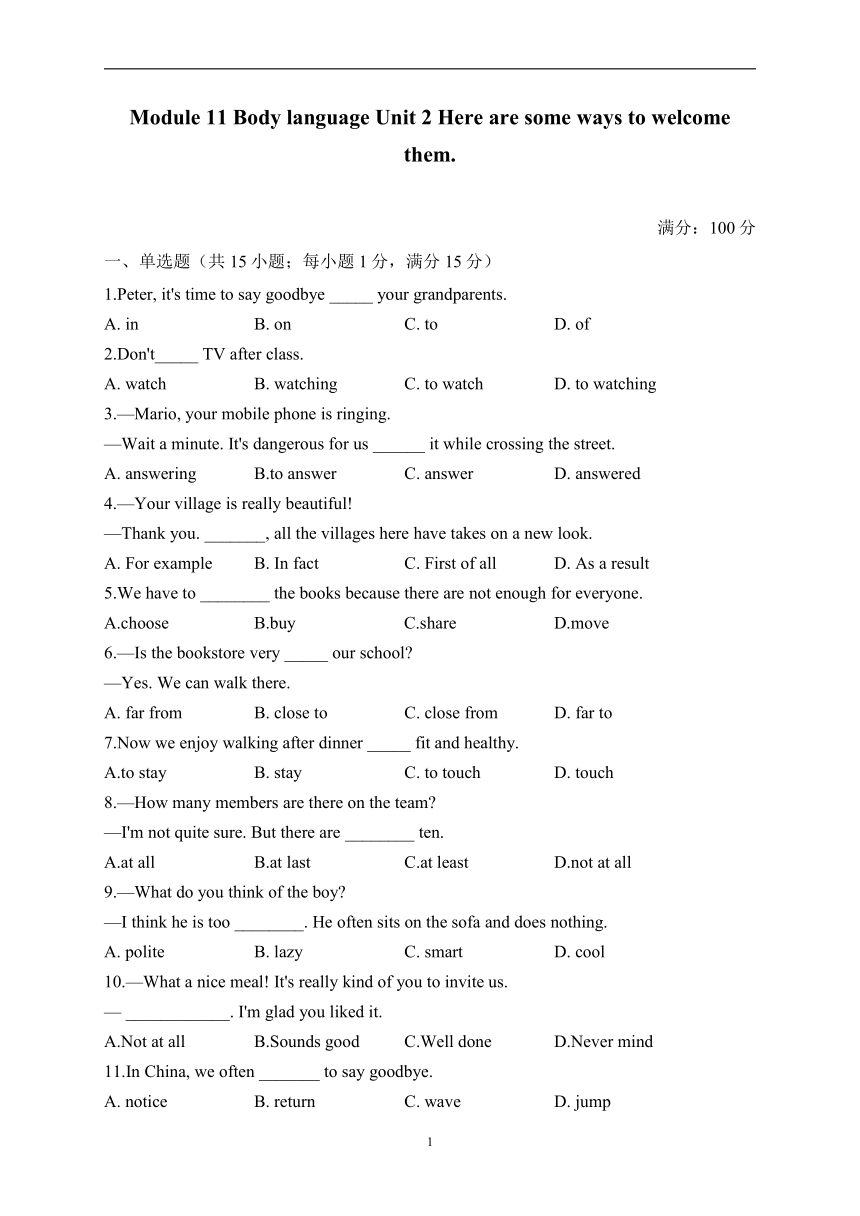 | |
| 格式 | docx | ||
| 文件大小 | 34.4KB | ||
| 资源类型 | 教案 | ||
| 版本资源 | 外研版 | ||
| 科目 | 英语 | ||
| 更新时间 | 2023-09-13 13:47:43 | ||
图片预览

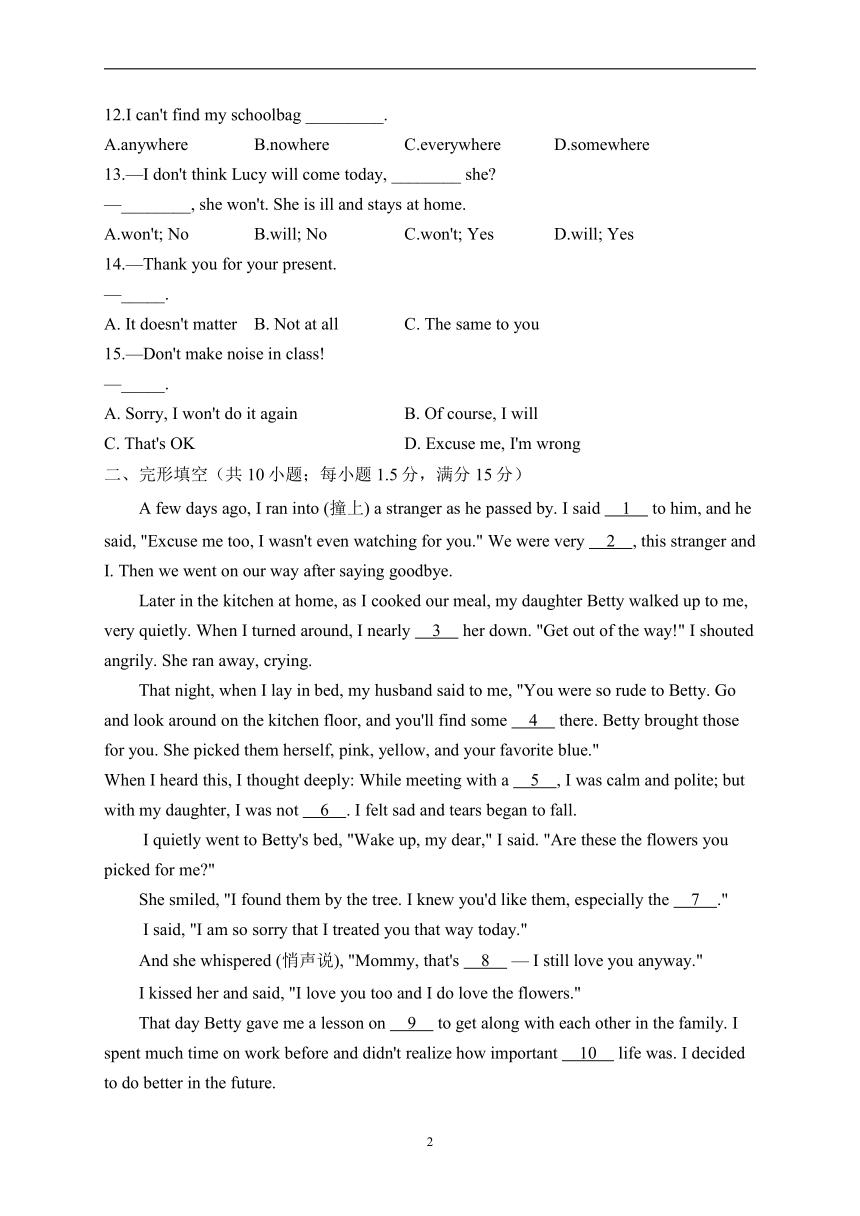
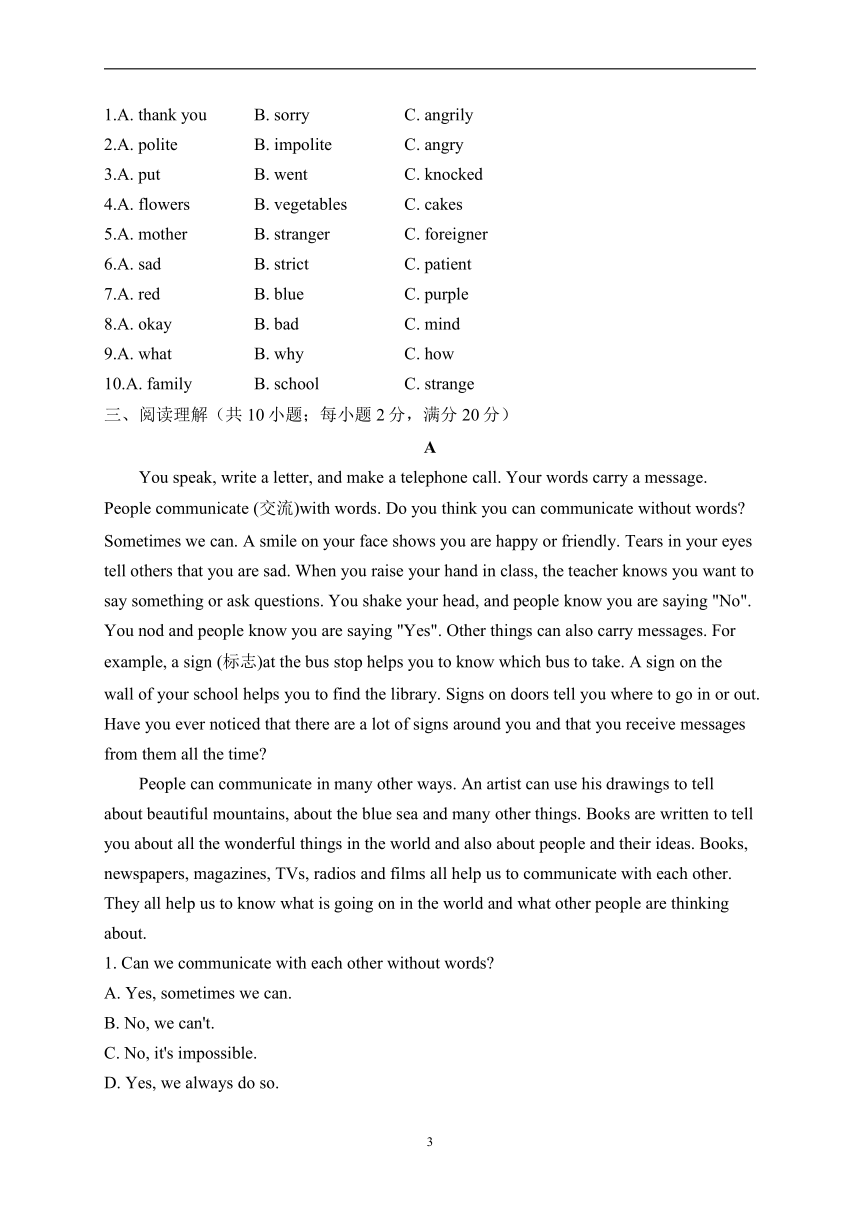
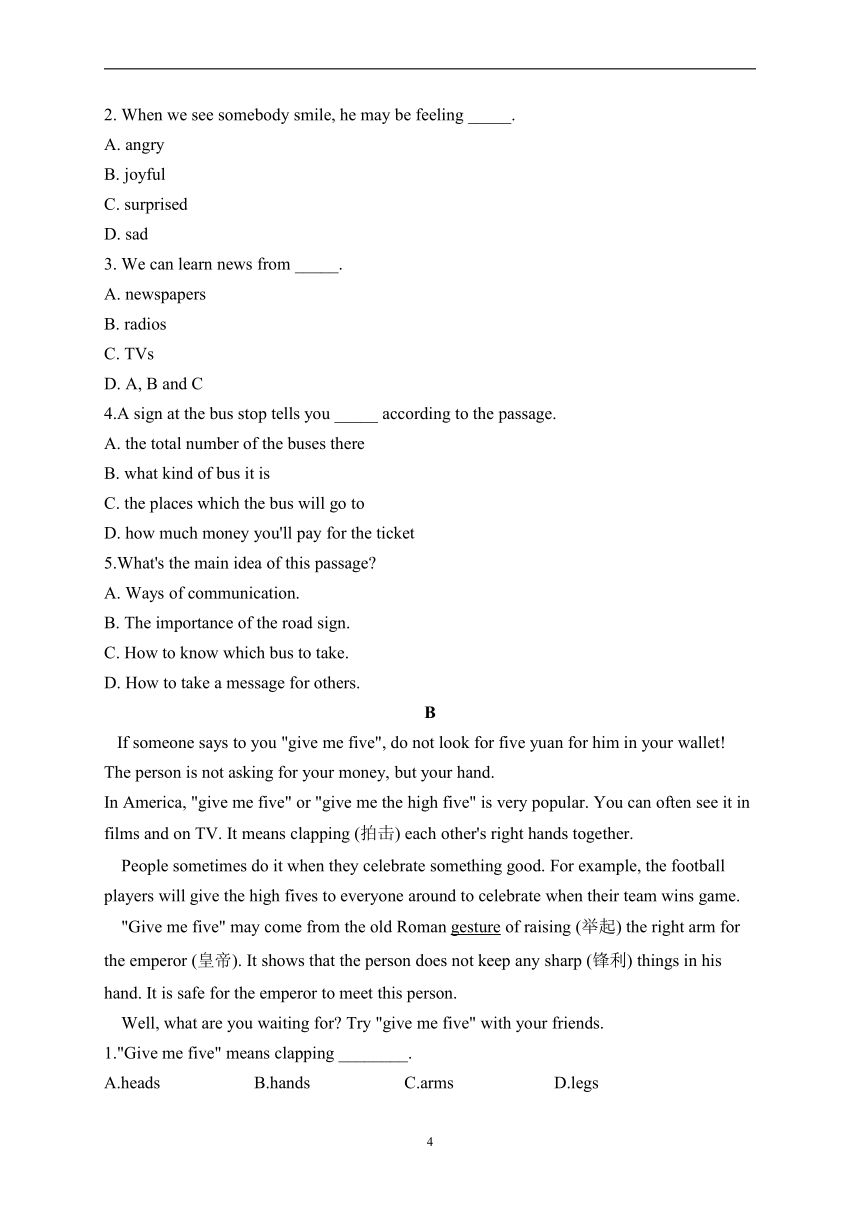
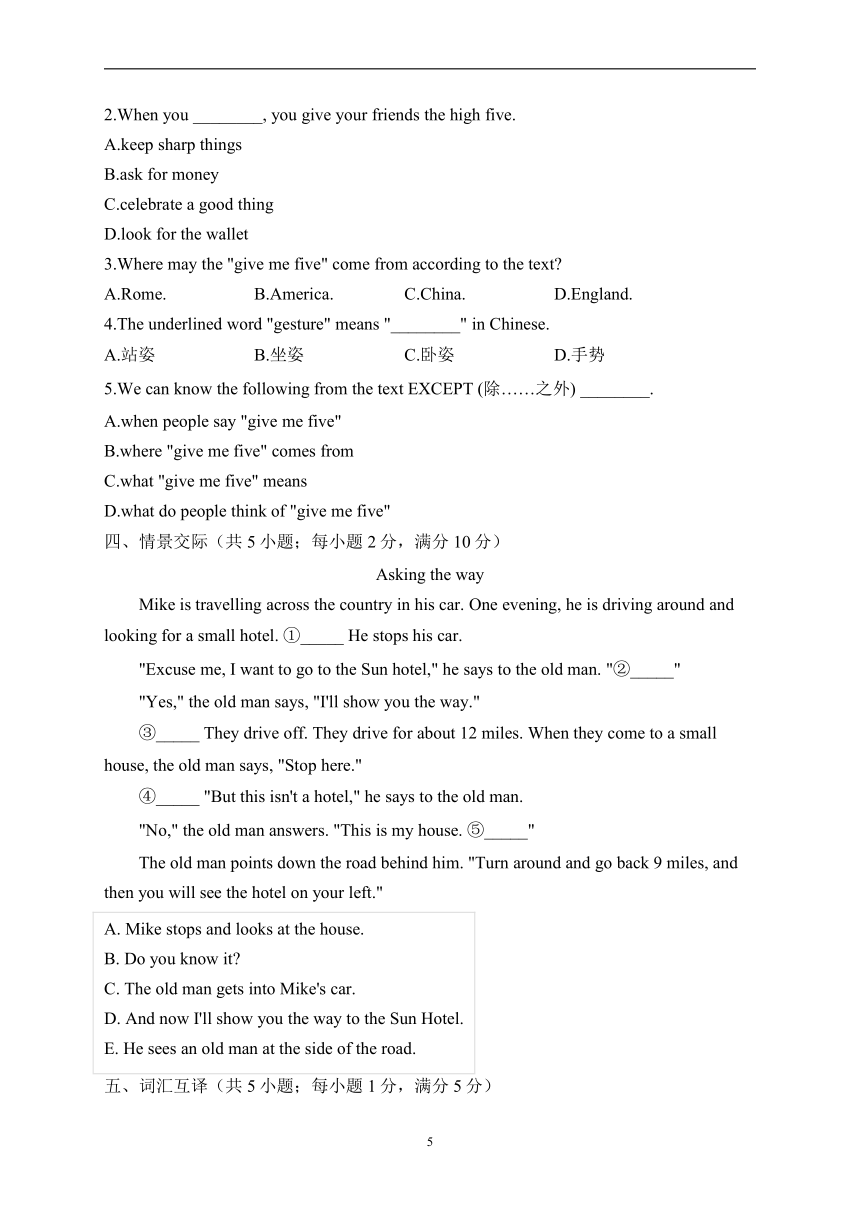
文档简介
Module 11 Body language Unit 2 Here are some ways to welcome them.
满分:100分
一、单选题(共15小题;每小题1分,满分15分)
1.Peter, it's time to say goodbye _____ your grandparents.
A. in B. on C. to D. of
2.Don't_____ TV after class.
A. watch B. watching C. to watch D. to watching
3.—Mario, your mobile phone is ringing.
—Wait a minute. It's dangerous for us ______ it while crossing the street.
A. answering B.to answer C. answer D. answered
4.—Your village is really beautiful!
—Thank you. _______, all the villages here have takes on a new look.
A. For example B. In fact C. First of all D. As a result
5.We have to ________ the books because there are not enough for everyone.
A.choose B.buy C.share D.move
6.—Is the bookstore very _____ our school
—Yes. We can walk there.
A. far from B. close to C. close from D. far to
7.Now we enjoy walking after dinner _____ fit and healthy.
A.to stay B. stay C. to touch D. touch
8.—How many members are there on the team
—I'm not quite sure. But there are ________ ten.
A.at all B.at last C.at least D.not at all
9.—What do you think of the boy
—I think he is too ________. He often sits on the sofa and does nothing.
A. polite B. lazy C. smart D. cool
10.—What a nice meal! It's really kind of you to invite us.
— ____________. I'm glad you liked it.
A.Not at all B.Sounds good C.Well done D.Never mind
11.In China, we often _______ to say goodbye.
A. notice B. return C. wave D. jump
12.I can't find my schoolbag _________.
A.anywhere B.nowhere C.everywhere D.somewhere
13.—I don't think Lucy will come today, ________ she
—________, she won't. She is ill and stays at home.
A.won't; No B.will; No C.won't; Yes D.will; Yes
14.—Thank you for your present.
—_____.
A. It doesn't matter B. Not at all C. The same to you
15.—Don't make noise in class!
—_____.
A. Sorry, I won't do it again B. Of course, I will
C. That's OK D. Excuse me, I'm wrong
二、完形填空(共10小题;每小题1.5分,满分15分)
A few days ago, I ran into (撞上) a stranger as he passed by. I said 1 to him, and he said, "Excuse me too, I wasn't even watching for you." We were very 2 , this stranger and I. Then we went on our way after saying goodbye.
Later in the kitchen at home, as I cooked our meal, my daughter Betty walked up to me, very quietly. When I turned around, I nearly 3 her down. "Get out of the way!" I shouted angrily. She ran away, crying.
That night, when I lay in bed, my husband said to me, "You were so rude to Betty. Go and look around on the kitchen floor, and you'll find some 4 there. Betty brought those for you. She picked them herself, pink, yellow, and your favorite blue."
When I heard this, I thought deeply: While meeting with a 5 , I was calm and polite; but with my daughter, I was not 6 . I felt sad and tears began to fall.
I quietly went to Betty's bed, "Wake up, my dear," I said. "Are these the flowers you picked for me "
She smiled, "I found them by the tree. I knew you'd like them, especially the 7 ."
I said, "I am so sorry that I treated you that way today."
And she whispered (悄声说), "Mommy, that's 8 — I still love you anyway."
I kissed her and said, "I love you too and I do love the flowers."
That day Betty gave me a lesson on 9 to get along with each other in the family. I spent much time on work before and didn't realize how important 10 life was. I decided to do better in the future.
1.A. thank you B. sorry C. angrily
2.A. polite B. impolite C. angry
3.A. put B. went C. knocked
4.A. flowers B. vegetables C. cakes
5.A. mother B. stranger C. foreigner
6.A. sad B. strict C. patient
7.A. red B. blue C. purple
8.A. okay B. bad C. mind
9.A. what B. why C. how
10.A. family B. school C. strange
三、阅读理解(共10小题;每小题2分,满分20分)
A
You speak, write a letter, and make a telephone call. Your words carry a message. People communicate (交流)with words. Do you think you can communicate without words Sometimes we can. A smile on your face shows you are happy or friendly. Tears in your eyes tell others that you are sad. When you raise your hand in class, the teacher knows you want to say something or ask questions. You shake your head, and people know you are saying "No". You nod and people know you are saying "Yes". Other things can also carry messages. For example, a sign (标志)at the bus stop helps you to know which bus to take. A sign on the wall of your school helps you to find the library. Signs on doors tell you where to go in or out. Have you ever noticed that there are a lot of signs around you and that you receive messages from them all the time
People can communicate in many other ways. An artist can use his drawings to tell about beautiful mountains, about the blue sea and many other things. Books are written to tell you about all the wonderful things in the world and also about people and their ideas. Books, newspapers, magazines, TVs, radios and films all help us to communicate with each other. They all help us to know what is going on in the world and what other people are thinking about.
1. Can we communicate with each other without words
A. Yes, sometimes we can.
B. No, we can't.
C. No, it's impossible.
D. Yes, we always do so.
2. When we see somebody smile, he may be feeling _____.
A. angry
B. joyful
C. surprised
D. sad
3. We can learn news from _____.
A. newspapers
B. radios
C. TVs
D. A, B and C
4.A sign at the bus stop tells you _____ according to the passage.
A. the total number of the buses there
B. what kind of bus it is
C. the places which the bus will go to
D. how much money you'll pay for the ticket
5.What's the main idea of this passage
A. Ways of communication.
B. The importance of the road sign.
C. How to know which bus to take.
D. How to take a message for others.
B
If someone says to you "give me five", do not look for five yuan for him in your wallet! The person is not asking for your money, but your hand.
In America, "give me five" or "give me the high five" is very popular. You can often see it in films and on TV. It means clapping (拍击) each other's right hands together.
People sometimes do it when they celebrate something good. For example, the football players will give the high fives to everyone around to celebrate when their team wins game.
"Give me five" may come from the old Roman gesture of raising (举起) the right arm for the emperor (皇帝). It shows that the person does not keep any sharp (锋利) things in his hand. It is safe for the emperor to meet this person.
Well, what are you waiting for Try "give me five" with your friends.
1."Give me five" means clapping ________.
A.heads B.hands C.arms D.legs
2.When you ________, you give your friends the high five.
A.keep sharp things
B.ask for money
C.celebrate a good thing
D.look for the wallet
3.Where may the "give me five" come from according to the text
A.Rome. B.America. C.China. D.England.
4.The underlined word "gesture" means "________" in Chinese.
A.站姿 B.坐姿 C.卧姿 D.手势
5.We can know the following from the text EXCEPT (除……之外) ________.
A.when people say "give me five"
B.where "give me five" comes from
C.what "give me five" means
D.what do people think of "give me five"
四、情景交际(共5小题;每小题2分,满分10分)
Asking the way
Mike is travelling across the country in his car. One evening, he is driving around and looking for a small hotel. ①_____ He stops his car.
"Excuse me, I want to go to the Sun hotel," he says to the old man. "②_____"
"Yes," the old man says, "I'll show you the way."
③_____ They drive off. They drive for about 12 miles. When they come to a small house, the old man says, "Stop here."
④_____ "But this isn't a hotel," he says to the old man.
"No," the old man answers. "This is my house. ⑤_____"
The old man points down the road behind him. "Turn around and go back 9 miles, and then you will see the hotel on your left."
A. Mike stops and looks at the house. B. Do you know it C. The old man gets into Mike's car. D. And now I'll show you the way to the Sun Hotel. E. He sees an old man at the side of the road.
五、词汇互译(共5小题;每小题1分,满分5分)
1.They want to ________(搬家) to New York.
2.Let's go ________ (某处) warm for the winter holiday.
3.Many ________ (外国的) countries want to make friends with China now.
4.They ________ (挥手) to say goodbye to me and left.
5.It is not ________(礼貌的) to make too much noise while eating or drinking.
六、句型转换(共5小题;每小题2分,满分10分)
1.Stand too close to North Americans. (改为否定句)
______ _______ too close to North Americans.
2.Please give me an eraser. (改为同义句)
Please __________ an eraser _________ _________.
3.You can't eat candy in class. (改为祈使句)
__________ ___________ candy in class.
3.It rained yesterday. They didn't go to the concert. (合并为一句)
It rained yesterday, _______ they didn't go to the concert.
4.To keep the classroom clean and tidy is important. (改为同义句)
_______ important _________ ________ the classroom clean and tidy.
七、书面表达(共1小题;满分25分)
中国和美国的课堂是有一些差异的,请根据下列表格中的信息描述一下这些差异,并谈谈自己的看法。60词以上。
中国课堂 美国课堂
(1)不直呼老师的姓名 (2)认真听课、做笔记 (3)举手发言 (1)学生面对面坐 (2)比较放松,可以喝饮料 (3)自由讨论
参考词汇:face to face面对面;freely自由地
___________________________________________________________________________
___________________________________________________________________________
___________________________________________________________________________
___________________________________________________________________________
答案以及解析
一、单选题
1.答案:C
解析:句意为:彼得,该向你爷爷奶奶告别了。say goodbye to sb意为"向某人告别",为固定用法。 故选C。
2.答案:A
解析:句意为:下课后不要看电视。根据语境可知, 此处为祈使句的否定形式,其结构为"Don't+动词原形"。故选A。
3.答案:B
解析:考查固定结构。句意:—马里奥,你的手机在响。—稍等,过马路时接电话对于我们来说是很危险的。It's+形容词+for sb. to do sth.意为"做某事对于某人来说是……的",为固定结构。故选B。
4.答案:B
解析:本题考查短语辨析。—你们村真漂亮!—谢谢。其实, 这里所有的村子都焕然一新了。for example例如; in fact实际上; first of all首先; as a result结果。故B项符合语境。故选B。
5.答案:C
解析:句意:我们必须分享这些书,因为没有足够的书分给每个人。考查动词辨析。choose选择;buy买;share分享;move移动,根据空后的"because there are not enough for everyone"可知,应该是分享这些书。故选C。
6.答案:B
解析:句意为:—那家书店离我们学校很近吗 —是的。我们可以走着去那里。根据答语中的"We can walk there."可知, 书店离学校不远。be far from...意为"离……远";be close to...意为"离……近";C项与D项表达错误。结合语境。故选B。
7.答案:A
解析:此处应用动词不定式作目的状语;短语stay fit and healthy意为"保持健康"。故选A。
8.答案:C
解析:句意:—这个队有多少队员 —我不十分确定。但至少有十个队员。考查介词短语辨析。at all完全; at last最后; at least至少;not at all一点也不。结合上一句"I'm not quite sure."可知此处在预估队员的数量。故选C。
9.答案:B
解析:句意:——你觉得这个男孩怎么样?——我认为他太懒了。他经常坐在沙发上什么也不干。考查形容词辨析。polite有礼貌的;lazy懒惰的;smart聪明的;cool凉爽的。根据后句"He often sits on the sofa and does nothing."可知,应是认为他太懒了。故选B。
10.答案:A
解析:句意:——多好吃的一顿饭啊!你邀请我们真是太好了。——别客气。我很高兴你们喜欢。考查情景交际。Not at all别客气;Sounds good听起来很好;Well done做得好;Never mind没关系。根据上句"What a nice meal! It's really kind of you to invite us."情景可知,空处应是对上句感谢的回答,故用"别客气"符合情景。故选A。
11.答案:C
解析:句意:在中国,我们经常挥手告别。考查动词辨析。notice注意;return返回;wave挥手;jump跳。根据"we often...to say goodbye."可知是挥手告别。故选C。
12.答案:A
解析:句意:我在任何地方都找不到我的书包。考查副词辨析。anywhere任何地方;nowhere无处;everywhere到处;somewhere某处。根据"I can't find my schoolbag"可知否定句中用anywhere。故选A。
13.答案:B
解析:句意:—我想露西今天不会来了, 是吗 —对, 她不会。她病了, 呆在家里。考查宾语从句的反意疑问句。根据"I don't think"可知, 反意疑问句看宾语从句部分; 再者根据否定前移和"Lucy will come today"可知, 第一空"will"符合句意; 根据"she won't"可知, "No"符合句意。故选B。
14.答案:B
解析:It doesn't matter意为"不要紧",用于回应别人的歉意; Not at all意为"别客气",用于回应别人的感谢;The same to you意为"你也是",用于回答别人的祝福。此处应回应别人的感谢。故选 B。
15.答案:A
解析:根据上句句意"不要在班里制造噪声!"可知选A。
二、完形填空
答案:1-5AACAB 6-10CBACA
解析:1.句意:我向他道了歉,他说:"我也很抱歉,我甚至没注意到你。"thank you谢谢你;sorry对不起;angrily生气地。根据"Excuse me too"可知,此处指的是作者对撞倒他感到抱歉。故选B。
2.句意:这个陌生人和我都是礼貌的。polite礼貌的;impolite不礼貌的;angry生气的。根据上文提到的"I said sorry to him"及"Excuse me too"可知,双方都很礼貌。故选A。
3.句意:我转过身,差点把她撞倒。put放置;went去;knocked撞。根据"my daughter Betty walked up to me, very quietly."可知,女儿悄悄地走向我,我转身差点撞倒她。故选C。
4.句意:去厨房的地板上看看,你会发现那里有一些花。flowers花;vegetables蔬菜;cakes蛋糕。根据下文的"Are these the flowers you picked for me "可知,地板上的是花。故选A。
5.句意:与陌生人见面时,我冷静而有礼貌;但对于我女儿,我没有耐心。mother妈妈;stranger陌生人;foreigner外国人。根据上文"I ran into (撞上) a stranger as he passed by."可知,撞倒陌生人,我很有礼貌。故选B。
6.句意:与陌生人见面时,我冷静而有礼貌;但对于我女儿,我没有耐心。sad悲伤的;strict严厉的;patient耐心的。根据"You were so rude to Betty."可知,我对女儿是粗鲁的,没有耐心的。故选C。
7.句意:我知道你会喜欢的,尤其是蓝色的花。red红色;blue蓝色;purple紫色。根据"She picked them herself, pink, yellow, and your favorite blue."可知,尤其是我最喜欢的蓝色的花。故选B。
8.句意:妈妈,没关系 —— 反正我还是爱你。okay好;bad坏的;mind介意。根据"I still love you anyway"可知,此处表示的是没关系,that's okay表示"没关系"。故选A。
9.句意:那天Betty给我上了一堂课,教我如何在家庭中与人相处。what什么;why为什么;how如何。根据"to get along with each other in the family."可知,此处指的是如何在家庭中与人相处。故选C。
10.句意:我以前在工作上花了很多时间,但没有意识到家庭生活有多么重要。family家庭;school学校;strange奇怪的。根据"That day Betty gave me a lesson on ... to get along with each other in the family."可知,此处指的是没有意识到家庭生活很重要。故选A。
三、阅读理解
A
答案:1-5ABDCA
解析:1.细节理解题。根据第一段的"Do you think you can communicate without words Sometimes we can."可知,有时候我们不用语言也可以沟通。故选A。
2.细节理解题。根据第一段的"A smile on your face shows you are happy or friendly."可知,你脸上的笑容显示你是快乐的或友好的。 joyful意为 "欢乐的",符合题意。故选B。
3.细节理解题。根据第二段的"Books, newspapers, magazines, TVs, radios and films all help us to communicate with each other."可知。故选 D 。
4.细节理解题。根据第一段的a sign at the bus stop helps you to know which bus to take 可知在公共汽车站的标志的帮助下,你可以知道公共汽车将要去的地方。故选C。
5.主旨大意题。通读全文可知,本文主要讲述了人们的不同的交流方式。故选A。
B
答案:1.B; 2.C; 3.A; 4.D; 5.D
解析:1.细节理解题。根据第二段"It means clapping (拍击) each other's right hands together"可知,人们使用右手双击表示这个动作。故选B。
2.细节理解题。根据第三段"People sometimes do it when they celebrate something good"可知,当人们庆祝一些好事时,会进行击掌庆祝。故选C。
3.细节理解题。根据第四段""Give me five" may come from the old Roman gesture of raising (举起) the right arm for the emperor"可知这个手势动作来自古罗马。故选A。
4.词义猜测题。根据第四段"raising (举起) the right arm"可知,击掌来自于古罗马,是一个手势,所以"gesture"表示"手势"。故选D。
5.细节理解题。根据"People sometimes do it when they celebrate something good." "'Give me five' may come from the old Roman gesture of raising (举起) the right arm for the emperor" "It means clapping (拍击) each other's right hands together"可知,本文介绍了"Give me five"用在什么时候,来自哪里以及它的意义。故选D。
四、情景交际
答案:①-⑤EBCAD
解析:①根据下文的"He stops his car."和 he says to the old man可知E项(他看到一位老人在路边。)符合语境。故选E。
②根据下文的Yes可知此处是一个一般疑问句, 因此B项(你知道它吗 )符合语境。故选B。
③根据下文的"They drive off."可知C项(老人上了迈克的车。)符合语境。故选C。
④根据下文的But this isn't a hotel可知A项(迈克停下来看了看房子。)符合语境。故选A。
⑤根据下文的"'Turn around and go back 9 miles, and then you will see the hotel on your left.'"可知D项(现在我来告诉你去太阳旅馆的路。)符合语境。故选D。
五、词汇互译
1.答案:move
2.答案:somewhere
3.答案:foreign
4.答案:waved
5.答案:polite
六、句型转换
1.答案:Don't stand
2.答案:give, to me
3.答案:Don't eat
4.答案:so
5.答案:It's, to keep
七、书面表达
答案:
There are some differences between a Chinese class and an American class. Now let's have a look.
In China, students call their teachers with "Mr" or "Ms". In class, they always listen to teachers and take notes carefully. If they want to say something, they should put up their hands first.
But in America, it's very different from that in China. The students sit around desks face to face. They can drink in class and they can talk freely too. But I think the Chinese class is better. It's polite of the students to obey the school rules.
2
满分:100分
一、单选题(共15小题;每小题1分,满分15分)
1.Peter, it's time to say goodbye _____ your grandparents.
A. in B. on C. to D. of
2.Don't_____ TV after class.
A. watch B. watching C. to watch D. to watching
3.—Mario, your mobile phone is ringing.
—Wait a minute. It's dangerous for us ______ it while crossing the street.
A. answering B.to answer C. answer D. answered
4.—Your village is really beautiful!
—Thank you. _______, all the villages here have takes on a new look.
A. For example B. In fact C. First of all D. As a result
5.We have to ________ the books because there are not enough for everyone.
A.choose B.buy C.share D.move
6.—Is the bookstore very _____ our school
—Yes. We can walk there.
A. far from B. close to C. close from D. far to
7.Now we enjoy walking after dinner _____ fit and healthy.
A.to stay B. stay C. to touch D. touch
8.—How many members are there on the team
—I'm not quite sure. But there are ________ ten.
A.at all B.at last C.at least D.not at all
9.—What do you think of the boy
—I think he is too ________. He often sits on the sofa and does nothing.
A. polite B. lazy C. smart D. cool
10.—What a nice meal! It's really kind of you to invite us.
— ____________. I'm glad you liked it.
A.Not at all B.Sounds good C.Well done D.Never mind
11.In China, we often _______ to say goodbye.
A. notice B. return C. wave D. jump
12.I can't find my schoolbag _________.
A.anywhere B.nowhere C.everywhere D.somewhere
13.—I don't think Lucy will come today, ________ she
—________, she won't. She is ill and stays at home.
A.won't; No B.will; No C.won't; Yes D.will; Yes
14.—Thank you for your present.
—_____.
A. It doesn't matter B. Not at all C. The same to you
15.—Don't make noise in class!
—_____.
A. Sorry, I won't do it again B. Of course, I will
C. That's OK D. Excuse me, I'm wrong
二、完形填空(共10小题;每小题1.5分,满分15分)
A few days ago, I ran into (撞上) a stranger as he passed by. I said 1 to him, and he said, "Excuse me too, I wasn't even watching for you." We were very 2 , this stranger and I. Then we went on our way after saying goodbye.
Later in the kitchen at home, as I cooked our meal, my daughter Betty walked up to me, very quietly. When I turned around, I nearly 3 her down. "Get out of the way!" I shouted angrily. She ran away, crying.
That night, when I lay in bed, my husband said to me, "You were so rude to Betty. Go and look around on the kitchen floor, and you'll find some 4 there. Betty brought those for you. She picked them herself, pink, yellow, and your favorite blue."
When I heard this, I thought deeply: While meeting with a 5 , I was calm and polite; but with my daughter, I was not 6 . I felt sad and tears began to fall.
I quietly went to Betty's bed, "Wake up, my dear," I said. "Are these the flowers you picked for me "
She smiled, "I found them by the tree. I knew you'd like them, especially the 7 ."
I said, "I am so sorry that I treated you that way today."
And she whispered (悄声说), "Mommy, that's 8 — I still love you anyway."
I kissed her and said, "I love you too and I do love the flowers."
That day Betty gave me a lesson on 9 to get along with each other in the family. I spent much time on work before and didn't realize how important 10 life was. I decided to do better in the future.
1.A. thank you B. sorry C. angrily
2.A. polite B. impolite C. angry
3.A. put B. went C. knocked
4.A. flowers B. vegetables C. cakes
5.A. mother B. stranger C. foreigner
6.A. sad B. strict C. patient
7.A. red B. blue C. purple
8.A. okay B. bad C. mind
9.A. what B. why C. how
10.A. family B. school C. strange
三、阅读理解(共10小题;每小题2分,满分20分)
A
You speak, write a letter, and make a telephone call. Your words carry a message. People communicate (交流)with words. Do you think you can communicate without words Sometimes we can. A smile on your face shows you are happy or friendly. Tears in your eyes tell others that you are sad. When you raise your hand in class, the teacher knows you want to say something or ask questions. You shake your head, and people know you are saying "No". You nod and people know you are saying "Yes". Other things can also carry messages. For example, a sign (标志)at the bus stop helps you to know which bus to take. A sign on the wall of your school helps you to find the library. Signs on doors tell you where to go in or out. Have you ever noticed that there are a lot of signs around you and that you receive messages from them all the time
People can communicate in many other ways. An artist can use his drawings to tell about beautiful mountains, about the blue sea and many other things. Books are written to tell you about all the wonderful things in the world and also about people and their ideas. Books, newspapers, magazines, TVs, radios and films all help us to communicate with each other. They all help us to know what is going on in the world and what other people are thinking about.
1. Can we communicate with each other without words
A. Yes, sometimes we can.
B. No, we can't.
C. No, it's impossible.
D. Yes, we always do so.
2. When we see somebody smile, he may be feeling _____.
A. angry
B. joyful
C. surprised
D. sad
3. We can learn news from _____.
A. newspapers
B. radios
C. TVs
D. A, B and C
4.A sign at the bus stop tells you _____ according to the passage.
A. the total number of the buses there
B. what kind of bus it is
C. the places which the bus will go to
D. how much money you'll pay for the ticket
5.What's the main idea of this passage
A. Ways of communication.
B. The importance of the road sign.
C. How to know which bus to take.
D. How to take a message for others.
B
If someone says to you "give me five", do not look for five yuan for him in your wallet! The person is not asking for your money, but your hand.
In America, "give me five" or "give me the high five" is very popular. You can often see it in films and on TV. It means clapping (拍击) each other's right hands together.
People sometimes do it when they celebrate something good. For example, the football players will give the high fives to everyone around to celebrate when their team wins game.
"Give me five" may come from the old Roman gesture of raising (举起) the right arm for the emperor (皇帝). It shows that the person does not keep any sharp (锋利) things in his hand. It is safe for the emperor to meet this person.
Well, what are you waiting for Try "give me five" with your friends.
1."Give me five" means clapping ________.
A.heads B.hands C.arms D.legs
2.When you ________, you give your friends the high five.
A.keep sharp things
B.ask for money
C.celebrate a good thing
D.look for the wallet
3.Where may the "give me five" come from according to the text
A.Rome. B.America. C.China. D.England.
4.The underlined word "gesture" means "________" in Chinese.
A.站姿 B.坐姿 C.卧姿 D.手势
5.We can know the following from the text EXCEPT (除……之外) ________.
A.when people say "give me five"
B.where "give me five" comes from
C.what "give me five" means
D.what do people think of "give me five"
四、情景交际(共5小题;每小题2分,满分10分)
Asking the way
Mike is travelling across the country in his car. One evening, he is driving around and looking for a small hotel. ①_____ He stops his car.
"Excuse me, I want to go to the Sun hotel," he says to the old man. "②_____"
"Yes," the old man says, "I'll show you the way."
③_____ They drive off. They drive for about 12 miles. When they come to a small house, the old man says, "Stop here."
④_____ "But this isn't a hotel," he says to the old man.
"No," the old man answers. "This is my house. ⑤_____"
The old man points down the road behind him. "Turn around and go back 9 miles, and then you will see the hotel on your left."
A. Mike stops and looks at the house. B. Do you know it C. The old man gets into Mike's car. D. And now I'll show you the way to the Sun Hotel. E. He sees an old man at the side of the road.
五、词汇互译(共5小题;每小题1分,满分5分)
1.They want to ________(搬家) to New York.
2.Let's go ________ (某处) warm for the winter holiday.
3.Many ________ (外国的) countries want to make friends with China now.
4.They ________ (挥手) to say goodbye to me and left.
5.It is not ________(礼貌的) to make too much noise while eating or drinking.
六、句型转换(共5小题;每小题2分,满分10分)
1.Stand too close to North Americans. (改为否定句)
______ _______ too close to North Americans.
2.Please give me an eraser. (改为同义句)
Please __________ an eraser _________ _________.
3.You can't eat candy in class. (改为祈使句)
__________ ___________ candy in class.
3.It rained yesterday. They didn't go to the concert. (合并为一句)
It rained yesterday, _______ they didn't go to the concert.
4.To keep the classroom clean and tidy is important. (改为同义句)
_______ important _________ ________ the classroom clean and tidy.
七、书面表达(共1小题;满分25分)
中国和美国的课堂是有一些差异的,请根据下列表格中的信息描述一下这些差异,并谈谈自己的看法。60词以上。
中国课堂 美国课堂
(1)不直呼老师的姓名 (2)认真听课、做笔记 (3)举手发言 (1)学生面对面坐 (2)比较放松,可以喝饮料 (3)自由讨论
参考词汇:face to face面对面;freely自由地
___________________________________________________________________________
___________________________________________________________________________
___________________________________________________________________________
___________________________________________________________________________
答案以及解析
一、单选题
1.答案:C
解析:句意为:彼得,该向你爷爷奶奶告别了。say goodbye to sb意为"向某人告别",为固定用法。 故选C。
2.答案:A
解析:句意为:下课后不要看电视。根据语境可知, 此处为祈使句的否定形式,其结构为"Don't+动词原形"。故选A。
3.答案:B
解析:考查固定结构。句意:—马里奥,你的手机在响。—稍等,过马路时接电话对于我们来说是很危险的。It's+形容词+for sb. to do sth.意为"做某事对于某人来说是……的",为固定结构。故选B。
4.答案:B
解析:本题考查短语辨析。—你们村真漂亮!—谢谢。其实, 这里所有的村子都焕然一新了。for example例如; in fact实际上; first of all首先; as a result结果。故B项符合语境。故选B。
5.答案:C
解析:句意:我们必须分享这些书,因为没有足够的书分给每个人。考查动词辨析。choose选择;buy买;share分享;move移动,根据空后的"because there are not enough for everyone"可知,应该是分享这些书。故选C。
6.答案:B
解析:句意为:—那家书店离我们学校很近吗 —是的。我们可以走着去那里。根据答语中的"We can walk there."可知, 书店离学校不远。be far from...意为"离……远";be close to...意为"离……近";C项与D项表达错误。结合语境。故选B。
7.答案:A
解析:此处应用动词不定式作目的状语;短语stay fit and healthy意为"保持健康"。故选A。
8.答案:C
解析:句意:—这个队有多少队员 —我不十分确定。但至少有十个队员。考查介词短语辨析。at all完全; at last最后; at least至少;not at all一点也不。结合上一句"I'm not quite sure."可知此处在预估队员的数量。故选C。
9.答案:B
解析:句意:——你觉得这个男孩怎么样?——我认为他太懒了。他经常坐在沙发上什么也不干。考查形容词辨析。polite有礼貌的;lazy懒惰的;smart聪明的;cool凉爽的。根据后句"He often sits on the sofa and does nothing."可知,应是认为他太懒了。故选B。
10.答案:A
解析:句意:——多好吃的一顿饭啊!你邀请我们真是太好了。——别客气。我很高兴你们喜欢。考查情景交际。Not at all别客气;Sounds good听起来很好;Well done做得好;Never mind没关系。根据上句"What a nice meal! It's really kind of you to invite us."情景可知,空处应是对上句感谢的回答,故用"别客气"符合情景。故选A。
11.答案:C
解析:句意:在中国,我们经常挥手告别。考查动词辨析。notice注意;return返回;wave挥手;jump跳。根据"we often...to say goodbye."可知是挥手告别。故选C。
12.答案:A
解析:句意:我在任何地方都找不到我的书包。考查副词辨析。anywhere任何地方;nowhere无处;everywhere到处;somewhere某处。根据"I can't find my schoolbag"可知否定句中用anywhere。故选A。
13.答案:B
解析:句意:—我想露西今天不会来了, 是吗 —对, 她不会。她病了, 呆在家里。考查宾语从句的反意疑问句。根据"I don't think"可知, 反意疑问句看宾语从句部分; 再者根据否定前移和"Lucy will come today"可知, 第一空"will"符合句意; 根据"she won't"可知, "No"符合句意。故选B。
14.答案:B
解析:It doesn't matter意为"不要紧",用于回应别人的歉意; Not at all意为"别客气",用于回应别人的感谢;The same to you意为"你也是",用于回答别人的祝福。此处应回应别人的感谢。故选 B。
15.答案:A
解析:根据上句句意"不要在班里制造噪声!"可知选A。
二、完形填空
答案:1-5AACAB 6-10CBACA
解析:1.句意:我向他道了歉,他说:"我也很抱歉,我甚至没注意到你。"thank you谢谢你;sorry对不起;angrily生气地。根据"Excuse me too"可知,此处指的是作者对撞倒他感到抱歉。故选B。
2.句意:这个陌生人和我都是礼貌的。polite礼貌的;impolite不礼貌的;angry生气的。根据上文提到的"I said sorry to him"及"Excuse me too"可知,双方都很礼貌。故选A。
3.句意:我转过身,差点把她撞倒。put放置;went去;knocked撞。根据"my daughter Betty walked up to me, very quietly."可知,女儿悄悄地走向我,我转身差点撞倒她。故选C。
4.句意:去厨房的地板上看看,你会发现那里有一些花。flowers花;vegetables蔬菜;cakes蛋糕。根据下文的"Are these the flowers you picked for me "可知,地板上的是花。故选A。
5.句意:与陌生人见面时,我冷静而有礼貌;但对于我女儿,我没有耐心。mother妈妈;stranger陌生人;foreigner外国人。根据上文"I ran into (撞上) a stranger as he passed by."可知,撞倒陌生人,我很有礼貌。故选B。
6.句意:与陌生人见面时,我冷静而有礼貌;但对于我女儿,我没有耐心。sad悲伤的;strict严厉的;patient耐心的。根据"You were so rude to Betty."可知,我对女儿是粗鲁的,没有耐心的。故选C。
7.句意:我知道你会喜欢的,尤其是蓝色的花。red红色;blue蓝色;purple紫色。根据"She picked them herself, pink, yellow, and your favorite blue."可知,尤其是我最喜欢的蓝色的花。故选B。
8.句意:妈妈,没关系 —— 反正我还是爱你。okay好;bad坏的;mind介意。根据"I still love you anyway"可知,此处表示的是没关系,that's okay表示"没关系"。故选A。
9.句意:那天Betty给我上了一堂课,教我如何在家庭中与人相处。what什么;why为什么;how如何。根据"to get along with each other in the family."可知,此处指的是如何在家庭中与人相处。故选C。
10.句意:我以前在工作上花了很多时间,但没有意识到家庭生活有多么重要。family家庭;school学校;strange奇怪的。根据"That day Betty gave me a lesson on ... to get along with each other in the family."可知,此处指的是没有意识到家庭生活很重要。故选A。
三、阅读理解
A
答案:1-5ABDCA
解析:1.细节理解题。根据第一段的"Do you think you can communicate without words Sometimes we can."可知,有时候我们不用语言也可以沟通。故选A。
2.细节理解题。根据第一段的"A smile on your face shows you are happy or friendly."可知,你脸上的笑容显示你是快乐的或友好的。 joyful意为 "欢乐的",符合题意。故选B。
3.细节理解题。根据第二段的"Books, newspapers, magazines, TVs, radios and films all help us to communicate with each other."可知。故选 D 。
4.细节理解题。根据第一段的a sign at the bus stop helps you to know which bus to take 可知在公共汽车站的标志的帮助下,你可以知道公共汽车将要去的地方。故选C。
5.主旨大意题。通读全文可知,本文主要讲述了人们的不同的交流方式。故选A。
B
答案:1.B; 2.C; 3.A; 4.D; 5.D
解析:1.细节理解题。根据第二段"It means clapping (拍击) each other's right hands together"可知,人们使用右手双击表示这个动作。故选B。
2.细节理解题。根据第三段"People sometimes do it when they celebrate something good"可知,当人们庆祝一些好事时,会进行击掌庆祝。故选C。
3.细节理解题。根据第四段""Give me five" may come from the old Roman gesture of raising (举起) the right arm for the emperor"可知这个手势动作来自古罗马。故选A。
4.词义猜测题。根据第四段"raising (举起) the right arm"可知,击掌来自于古罗马,是一个手势,所以"gesture"表示"手势"。故选D。
5.细节理解题。根据"People sometimes do it when they celebrate something good." "'Give me five' may come from the old Roman gesture of raising (举起) the right arm for the emperor" "It means clapping (拍击) each other's right hands together"可知,本文介绍了"Give me five"用在什么时候,来自哪里以及它的意义。故选D。
四、情景交际
答案:①-⑤EBCAD
解析:①根据下文的"He stops his car."和 he says to the old man可知E项(他看到一位老人在路边。)符合语境。故选E。
②根据下文的Yes可知此处是一个一般疑问句, 因此B项(你知道它吗 )符合语境。故选B。
③根据下文的"They drive off."可知C项(老人上了迈克的车。)符合语境。故选C。
④根据下文的But this isn't a hotel可知A项(迈克停下来看了看房子。)符合语境。故选A。
⑤根据下文的"'Turn around and go back 9 miles, and then you will see the hotel on your left.'"可知D项(现在我来告诉你去太阳旅馆的路。)符合语境。故选D。
五、词汇互译
1.答案:move
2.答案:somewhere
3.答案:foreign
4.答案:waved
5.答案:polite
六、句型转换
1.答案:Don't stand
2.答案:give, to me
3.答案:Don't eat
4.答案:so
5.答案:It's, to keep
七、书面表达
答案:
There are some differences between a Chinese class and an American class. Now let's have a look.
In China, students call their teachers with "Mr" or "Ms". In class, they always listen to teachers and take notes carefully. If they want to say something, they should put up their hands first.
But in America, it's very different from that in China. The students sit around desks face to face. They can drink in class and they can talk freely too. But I think the Chinese class is better. It's polite of the students to obey the school rules.
2
同课章节目录
- Module 1 Lost and found
- Unit 1 Whose bag is this?
- Unit 2 Are they yours?
- Unit 3 Language in use
- Module 2 What can you do ?
- Unit 1 I can play the piano
- Unit 2 I can run really fast
- Unit 3 Language in use
- Module 3 Making plans
- Unit 1 What are you going to do at the weekends?
- Unit 2 We're going to cheer the players.
- Unit 3 Language in use
- Module 4 Life in the future
- Unit 1 Everyone will study at home
- Unit 2 Every family will have a small plane.
- Unit 3 Language in use
- Module 5 Shopping
- Unit 1 What can I do for you?
- Unit 2 You can buy everything on the Internet
- Unit 3 Language in use
- Module 6 Around town
- Unit 1 Could you tell me how to get to the Nationa
- Unit 2 The London Eye is on your right.
- Unit 3 Language in use
- Revision module A
- Module 7 My past life
- Unit 1 I was born in a small village.
- Unit 2 I was born in Quincy.
- Unit 3 Language in use
- Module 8 Story time
- Unit 1 Once upon a time….
- Unit 2 Goldilocks hurried out of the house.
- Unit 3 Language in use
- Module 9 Life history
- Unit 1 He left school and began work at the age of
- Unit 2 He decided to be an actor.
- Unit 3 Language in use
- Module 10 A holiday journey
- Unit 1 What did you do?
- Unit 2 This morning we took a walk.
- Unit 3 Language in use
- Module 11 Body language
- Unit 1 They touch noses!
- Unit 2 Here are some ways to welcome them.
- Unit 3 Language in use
- Module 12 Western music
- Unit 1 It's so beautiful!
- Unit 2 Vienna is the centre of European classical
- Unit 3 Language in use
- Revision module B
